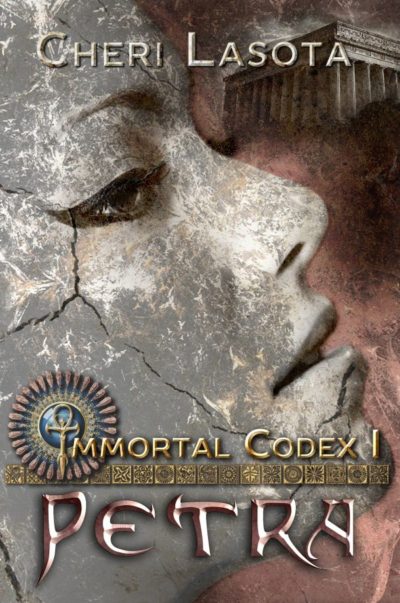Literary rating: ★★★
Kick-butt quotient: ☆☆
 Petra is a teenage Roman slave at around the birth of Christ. She is completely under the thumb of her sadistic master, Clarius, until a strange conjunction of events and a poisonous herb with mystical qualities changes the power dynamic entirely. Both of them, together with her lover, Lucius, attain immortality. But it’s an immortality which requires the two men to drink from Petra annually, or they will degenerate into sub-human monsters. Neither is happy with the arrangement: Clarius is not used to being reliant on anyone, least of all his former property, and Lucius hates the fact Petra agreed to submit to their ex-master, in order to save him. As the centuries stretch into millennia, Petra begins, slowly, to put together a group people who will be capable of defeating Lucius and the immortals he has recruited, allowing her to live in eternal peace with Lucius.
Petra is a teenage Roman slave at around the birth of Christ. She is completely under the thumb of her sadistic master, Clarius, until a strange conjunction of events and a poisonous herb with mystical qualities changes the power dynamic entirely. Both of them, together with her lover, Lucius, attain immortality. But it’s an immortality which requires the two men to drink from Petra annually, or they will degenerate into sub-human monsters. Neither is happy with the arrangement: Clarius is not used to being reliant on anyone, least of all his former property, and Lucius hates the fact Petra agreed to submit to their ex-master, in order to save him. As the centuries stretch into millennia, Petra begins, slowly, to put together a group people who will be capable of defeating Lucius and the immortals he has recruited, allowing her to live in eternal peace with Lucius.
If you’re getting a bit of an Interview With The Vampire vibe here, you are not far off the mark, with the story spanning multiple human lifetimes. Fortunately, it largely stays clear of the vampiric cliches, and what could have been little more than Twilight with delusions of historical significance becomes a little more. It’s recounted in flashback from the 18th century, though there are huge gaps in the narrative, where you’re left to wonder what Petra was doing during the 1,300+ intervening years. I’m still a little vague on the specific mechanism of the immortality, too: it is based on Petra’s blood, the herb, or is it the combination? But my major problem was the overpowering emphasis on the romantic angles. Look, we get it: Petra and Clarius are super in love. Now, can we move on to interesting anecdotes about life everlasting?
Proceedings take a sharp right turn in the 14th century, when Lucius has had enough of it all, and bails. This volume is, frankly, much more interesting with him not about. Petra goes in search of him, and the resulting adventure is easily the strongest section of the book. Hearing stories of an “immortal”, she heads out from Genoa, hoping that it’s her lover, and finds herself trapped in Kaffa, a port on the Crimean Peninsula, which is being besieged by the Mongol hordes. It’s a hellish landscape, made all the worse by the plague-infected corpses which the attackers lob over the walls (this actually happened – it was the first recorded case of biological warfare, and helped decimate Europe, as merchants who survived the siege brought bubonic plague with them when they returned home). This is a very well-handled meshing of historical events with fictional characters, working to good effect. I’d like to have seen more of this, and less sloppy romance.
Petra says that she’s an accomplished swordswoman – and given the hundreds of years she’s had to practice with weapons, that makes sense. There’s rather more talk than walk, in this volume, though I sense this may be a case of the author wanting to keep her powder dry for subsequent volumes and the battles against Clarius which seem destined to come. Would I read them? Hard to say. Lasota showed she has plenty of potential, but there’s still a risk this could end up collapsing into teenage mush. Probably a case where I’d borrow volume 2, or wait for a 99 cent sale on Amazon.
Author: Cheri Lasota
Publisher: CreateSpace, through Amazon – this was part of the Dominion Rising collection for Kindle.
Book 1 in the Immortal Codex series.




